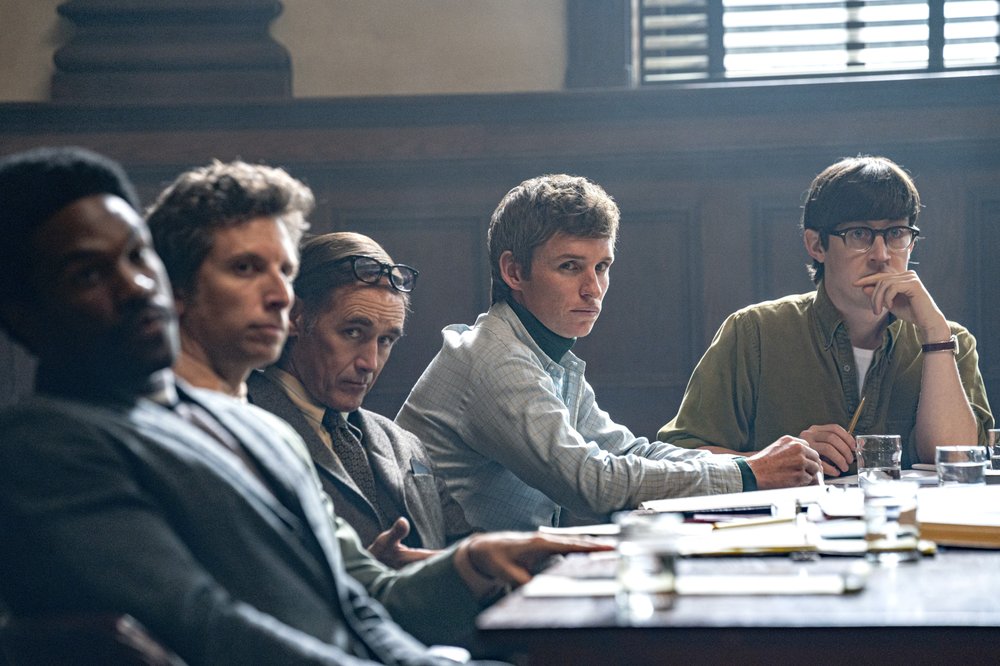

Instead of congregating on the stage of Los Angeles’ Shrine Auditorium for their best-ensemble win at the Screen Actors Guild Awards, the cast of “The Trial of the Chicago 7” called in on Zoom.
For a video conference, they make a starry bunch. Logging in from around the world were Sacha Baron Cohen, Eddie Redmayne, Frank Langella, Mark Rylance, John Carroll Lynch, Ben Shankman and other members of Aaron Sorkin’s historical courtroom drama.
After winning the guild’s top honor, the cast spoke briefly with The Associated Press in an interview recorded Thursday before Sunday’s broadcast of the pre-taped awards. Here, slightly edited for clarity, are their remarks.
You’re an especially varied group of actors with quite different styles and approaches. How did you coalesce as an ensemble?
EDDIE REDMAYNE: A lot of credit has to be given to Francine Maisler, who was our casting director. All of the characters represented in the film were so unique and so specific. I think she collected a group of actors who had completely different styles and completely different outlooks on the way to approach work. For me, what I loved when I got to see a cut of the movie was that you saw that. It was like a clash of different types of music, whether it was jazz or rock or classical — but all of that coming together under Aaron. He was the conductor, almost. So I give Aaron and Francine a huge amount of credit. It was a joy day-and-day-out to watch these great and different and varied actors slugging it out.
FRANK LANGELLA: There is something very powerful about working toward the greater good. Actors have a tendency to think about themselves a lot. How’s my lighting? Am I going to get my close-in my scene? But as I said in my speech, Aaron rose above that and caused all of us to do that.
JOHN CARROLL LYNCH: When you take a job in a movie called “The Trial of the Chicago 7,” there’s an assumption that it’s going to be an ensemble picture. It’s a self-selecting group of people who want to work with others so intimately and being willing to risk their own process in such quarters. It is a tribute to the casting and to Aaron’s script but also to the actors who said “yes.”
MICHAEL KEATON: Frankly, it’s an embarrassment to me. These guys did all the heavy lifting. I showed up for a couple days. I’m getting credit for not much — but I’ll take it.
REDMAYNE: Michael, I always think that’s more terrifying. It’s one thing to be on a job for a couple months. You had to come in for two days and knock it out of the park, and you did.
KEATON: I like actors and when I saw this cast I went, “Oh man, this is going to be ….” Even though I didn’t have much interaction with anybody, I liked it. I want to be part of that kind of group.
This is the first Netflix film or release from a streaming service to win the guild’s top award. It had once been set for theatrical release from Paramount Pictures. Now you’ve won this much-sought-after award over Zoom, does it feel strange?
LYNCH: It’s very frustrating because we did theatrical-distribution acting when it turned out to be streaming acting. I don’t know about you but this is not a Zoom suit. This is not a Zoom tux.
SACHA BARON COHEN: I must say I think it’s great that it came out on Netflix. The fear with a movie about an obscure historical event is that nobody goes to see it and it’s in the specialty box-office section. The beauty of some of these streamers is that millions of people around the world saw this movie and they now know this powerful story and saw a great bit of art. That is the plus-side of this not being theatrical. Hopefully it will come out at some point in the theaters, but I think we benefited from it being on a streamer.
LANGELLA: I like it like this because I hate award shows. I go to very few but when I do — the tuxedo, the lines, people all over. This is much more civilized. I’m in my bedroom slippers. It’s really comfortable.
KEATON: I have no pants on.
You’d normally about now be whisked away to some glamorous Hollywood party. Instead, you’re talking to me on a laptop.
REDMAYNE: Making films is such an odd process. You sort of come together with a disparate group of people. Sometimes you have rehearsals but on this we didn’t really have any. Actors would come in for a day or two. You make the film and you all go away again. The promoting process, sometimes, can be the moment when you actually all sit down and get to know each other. The only time we have all met up is on Zoom calls when someone like yourself is asking the questions. It feels unique. And I feel pretty lucky. But at the same time it sort of buries a slight sense of it not feeling complete.
LYNCH: There’s also one other piece of it that’s a big regret due to this circumstance. It’s not being able to go to the other actors who I’ve admired or been able to work with over the course of time in each of the films nominated, and thank them for the work they’ve done.